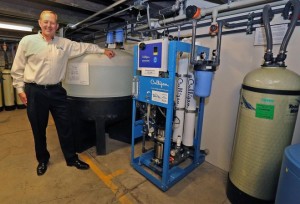Photo Credit: The Milwaukee Journal Sentinel
The Milwaukee Journal Sentinel recently wrote a great article about Milwaukee’s growth in water technology and ultrapure water. We’d like to explain how Milwaukee is transforming itself into a potential world water hub, and how Total Water fits in.
It’s an exciting and dire time to be in the ultrapure water technology business. As the MJS article points out, Total Water has been growing at about $1 million per year since 2005, and we don’t anticipate it slowing down anytime soon.
There’s been a growing interest in purified water systems all over the world in the past decade. It’s no surprise either – it’s difficult to go anywhere without hearing something about the current drought in California and the Southwest.
These water shortages, along with growing contamination issues, has forced the world to focus more on how it uses and reuses water. We’ve even seen drought-affected areas attempt to reuse 100% of their water.
The problem is, if you don’t properly treat water, it becomes contaminated and unusable. That’s what makes high-purity water treatment companies like Total Water so important. And we’re not the only Wisconsin company in the water-technology business. Other companies like AO Smith, Badger Meter and Culligan have also found a lot of success in recent years.
This proliferation of water-technology business coupled with the global demand for clean water lead to a realization: Perhaps there’s a way to pool all these resources together, and maybe Milwaukee is the right place to do it.
Milwaukee has set its sights on becoming a potential global water hub. The city has formed the Global Water Center, in which academia and research companies work together to solve water issues across the world – and Total Water is a key member. Here’s how it all fits together.
A Growing Need for Ultrapure Water
Ultrapure water is essentially a purified water system that must meet a high purity water standard (USP, CAP, NCCLS)- be it for pharmaceutical, biotechnology or laboratory use. In other words, it’s a high purity water system that can be validated and is ultimately regulated by an agency, like the Federal Drug Administration or another governing body.
Over the years, these standards have become increasingly strict. The first dialysis standards were set in 1976, and at the time were relatively relaxed. However, we’ve watched those standards evolve four times in the past 15 years, each time becoming much more strict in an effort to increase patient safety.
Now, the list of dialysis standards spans 300 pages long. If any clinic is audited and discovered to have not met its required standards, they won’t receive their allotted government funding.
This is obviously a huge concern – and not just for medical clinics either. Most regions around the country and world are struggling to meet their strict industrial, business and residential water needs.
That’s where we come in.
Our Role in the Global Water Center
The Global Water Center’s original goal was to bring water technology businesses and education together to solve global water issues. Today, it also serves as an incubator for new water technology businesses.
Total Water is helping by collaborating with nearby universities. The University of Wisconsin-Whitewater, UW-Milwaukee, and UW-Marquette all have offices in the Global Water Center. Working with each university allows us to attract talent to Milwaukee and retain it.
Even better, when considering Total Water’s available water usage, our treatment plants are only at 30 percent capacity. That means we have room to serve a huge amount of new businesses.
Our specific niche is that we design, build and install high-purity water systems. Designing these systems often requires custom engineering, so our on staff engineer and sales engineers work directly with the end user.
This approach has allowed us to design high-purity water systems that meet a customer’s exact needs, while also keeping them affordable.
All of these factors make Milwaukee the perfect city to rise to many of the world’s growing water concerns. At a time when producing ultrapure water is becoming increasingly important and challenging, Total Water is happy to be part of the solution.
We’ll do more than give you a quote—we’ll visit your site to analyze your industrial water needs.


Follow Us